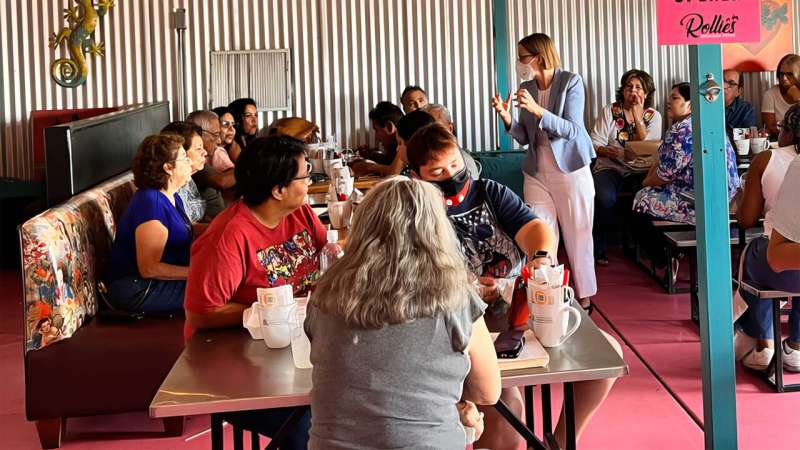This article has been reviewed according to Science X's editorial process and policies. Editors have highlighted the following attributes while ensuring the content's credibility:
fact-checked
trusted source
proofread
Study connects research scientists with the communities they serve

A new study by University of Arizona Cancer Center researchers piloted a unique outreach strategy to foster dialogue between basic scientists and community members to demystify basic science research and facilitate culturally tailored approaches to address health disparities of vulnerable communities.
The paper, published in the journal Cancer Causes and Control, analyzes the processes, experiences and lessons learned during the establishment of the Research Outreach for Southern Arizona, or ROSA, program.
"Basic science research is critical for understanding biological mechanisms essential to advances in cancer prevention, diagnoses and treatment. However, most of this research is conducted outside of the purview of community observation or input, leaving these research processes mysterious and subsequent findings disconnected from the communities they intend to benefit," said senior author Jennifer Hatcher, Ph.D., MPH, MSN, UArizona Cancer Center member and professor in the Mel and Enid Zuckerman College of Public Health.
"This study allowed us to develop strategies to build collaborations between basic scientists and Hispanic community members at the Cancer Center."
Researchers in the Cancer Center's Cancer Biology Program and Office of Community Outreach and Engagement partnered to develop the ROSA program. As part of the study, they formed a community working group, launched a community and student ambassador program, hosted scientific cafés and developed a community-based survey.
The Scientific Café series provided opportunities for community members to have discussions with researchers about cancer. The first event was held at Rollies Mexican Patio, which offered convenient access for people living in neighborhoods surrounding the restaurant located on Tucson's southwest side. Joann Sweasy, Ph.D., director of the UArizona Cancer Center, spoke to attendees while Adalberto Renteria, MD, medical director for the Pascua Yaqui tribe, translated for Spanish speakers.
Subsequent Scientific Cafés featured other speakers from the Cancer Center and included attendee surveys intended to help the ROSA team measure impact and make improvements.
"Accessibility, inclusivity and overall relevancy to the community—that's where culture plays a huge role in ROSA's focus," said Namoonga M. Mantina, the paper's first author and research program administrator in the Office of Community Outreach and Engagement.
"The Cancer Center is the only comprehensive cancer center headquartered in Arizona. The work that happens here needs to be relevant specifically to the communities of Arizona and our catchment area of Southern Arizona, which is a beautiful, colorful, diversely cultural place."
The study also resulted in the development of a 17-member working group comprised of researchers, University of Arizona Community Advisory Board members, a cancer survivor, bilingual community members from Chicanos por la Causa and Nostros Comprometidos a su Salud, and representatives of El Rio Health, Marana Health Center and Clínica Amistadconsists. The working group met to conceptualize new ways to reach community members.
While the study has ended, the success of the ROSA program has led researchers to continue the Scientific Café series this fall.
"ROSA helps connect people to that research that is currently taking place at the Cancer Center, but also does the flip side of that—it connects the researchers to the community. It benefits both sides," Mantina said.
More information: Namoonga M. Mantina et al, Building capacity for collaborative research between basic scientists and underrepresented communities in cancer research, Cancer Causes & Control (2023). DOI: 10.1007/s10552-023-01726-7

















